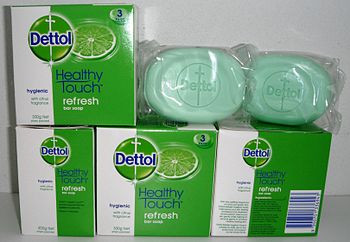- Dettol
-
Contents
Dettol is the trade name for a line of liquid and solid antiseptic cleansing products manufactured by Reckitt Benckiser.As several of the ingredients are insoluble in water, Dettol produces a white emulsion of oil droplets when diluted during use.
The active ingredient which defines its unique antiseptic property is an aromatic chemical compound known as chloroxylenol (C8H9ClO).
Chloroxylenol makes up 4.8% of Dettol's total mixture,[1] with the rest composed of pine oil, isopropanol, castor oil soap, caramel, and water.
The traditional liquid product is a light yellow colour, but becomes milky white when diluted in water. The diluted mixture can be used to clean cuts or wounds, etc.
Diluted Dettol may also be used to treat acne, however, no trials have been done, and is not approved for this indication by the Food and Drug Administration (FDA).[2]
Controversial use
See also: In humans
See also: In other animals
In Australia, Dettol spray has been shown to be lethal to cane toads, an invasive species imported from Hawaii due to a poor outlook and bad judgement in 1935 for cane beetle control.
Spraying the disinfectant at close range has been shown to cause fast-acting death. It's not known if the toxic effects are disintegrated or may harm other Australian wildlife and species.
Due to the concerns for potential harm to other Australian wildlife species, discovered use of Dettol as pest control was banned by the Department of Environment and Conservation in 2011.[3]
Toxicity
Reduce the risk of toxic exposure by utilizing safety masks, including goggles, avoid spraying in the vicinity of people or animals, and open doors or windows to allow ventilation.
In humans
As with other manufactured household cleaners, Dettol can has the potential for causing lethal toxicity. It is poisonous when ingested, and even when it is unintentionally inhaled.
In a case report, a 42-year-old British man died from Dettol overexposure in May 2007. The aftermath was inconclusive if the lethal exposure to Dettol was via ingestion or inhalation.[4]
In other animals
Dettol Cleansing Floor Wipes (disposable wipes) contain benzalkonium chloride, highly toxic to fish.
Avoid external exposure to the surface of the body, or inhalation, allowing rapid entry to the bloodstream.
See also
References
- ^ http://www.ezyshop.com.au/documents/msds/dettol_MSDN.pdf
- ^ Dr. Mike Thompson Molecule of the Month: Dettol
- ^ "Cane Toad Poison Banned". perth now. May 23, 2009. http://www.perthnow.com.au/news/cane-toad-poison-banned/story-e6frg12c-1225715177178. Retrieved September 23, 2011.
- ^ Lester Haines 'Dettol Man' cleans himself to death
Reckitt Benckiser Brands Aerogard · Air Wick · Amphyl · Bonjela · Brasso · Brio · Bryza · Calgon · Calgonit · Cattlemen's · Cherry Blossom · Cillit Bang · Clean & Smooth · Clearasil · Cling Free · Cobra · Colon · Coral · d-Con · Dettol · Dip It · Disprin · Dosia · Durex · Easy-Off · Easy On · Elena · Finish · Frank's Red Hot · French's · Gaviscon · Glassex · Glass Plus · Harpic · Hoffmann's · Kalia · Intima de Karinzi · Lanza · Lemsip · Lime-A-Way · Lovela · Lysol · Masterpiece · Metalist · Mop & Glo · Mortein · Mr. Min · Mr. Sheen · Mucinex · Nenuco · Noxon · Nugget · Nurofen · Old English · Poliflor · Quanto · Resolve · RID-X · Robin · Sagrotan · Sani Flush · Scholl · Senokot · Silvo · Sipuro · Strepsils · Vanish · Vani-Sol · Veet · Vivid · Wenol · Windolene · Wizard · Woolite · Yes · ZudPeople Bart Becht · Jeremiah Colman · Isaac ReckittOther Coty, Inc. · SSL International · The Garden Village
External links
Categories:- Antiseptics
- Soap brands
- Reckitt Benckiser brands
Wikimedia Foundation. 2010.

